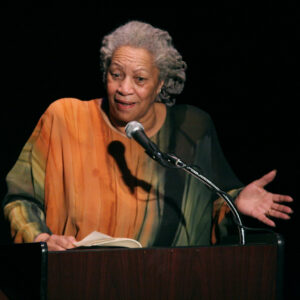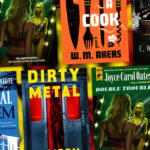
The Best Books About Books: Part 2
On Works of Criticism by Cynthia Ozick, C.D. Wright, Teju Cole, and More
Last summer, I wrote a piece about a number of books that were themselves about books, a category that happens to be my very favorite. Though I maybe should have anticipated it (it was, after all, a decidedly literary essay on a decidedly literary website), “The Best Books About Books” attracted a lot of attention—more so, I’m sure, because of the titles collected than for the quality of my writing. But nonetheless I was pleased to see those works receiving due promotion, which is mainly the only joy a critic experiences.
But I wrote that last piece—as I write this one—with something more than simply wanting to extol the work of great writers on great writers. I firmly believe, as Cynthia Ozick writes in her latest collection of literary essays:
As for the uses of criticism by the denizens of the present moment: envisioning society whole by way of the contemplation of its parts, the delicate along with the tumultuous, the weighty together with the trifling, is how a culture can learn to imagine its own face.
Without the critics, incoherence.
Obviously, as a critic, I’m a tad biased when it comes to criticism’s utility and efficacy, but I also don’t know how anyone could really argue Ozick’s point. Who doesn’t turn to a critic when considering a difficult work like T.S. Eliot’s The Waste Land or Virginia Woolf’s The Waves? Who doesn’t turn to, say, Edmund Wilson to research the literary culture of the 1920s (or 30s, or 40s, or 50s: Wilson was crazy productive)? Maybe Ozick’s word “incoherence” is a bit hyperbolic, but whatever terms I would replace it with don’t make criticism any less vital: Without the critics… ambiguity, confusion, uncertainty. Faced with the overwhelming number of books, with the immense history of literature, with the infinite complexity of art—who among us doesn’t look to experts (in their infinite specializations) for intellectual assistance?
At the very least, I know I look to critics for assistance—but also for the shared wonder of literary appreciation, for the solidarity of imaginative endeavors, and, most of all, for the extrapolated insights novels and stories and poems and plays inspire in those who engage with them. Critics don’t just describe the experience of a book—the best ones also relate, ecstatically, rapturously, uncannily, what can be learned from it.
So without further adieu, here are some of this year’s best books about books, part two.
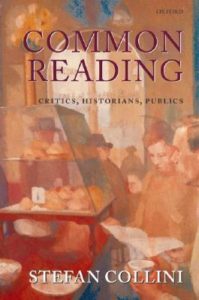
Common Reading: Critics, Historians, Publics, Stefan Collini, Oxford University Press
It seems appropriate to begin with Stefan Collini’s Common Reading since, like this very essay, it’s about writers “writing about writing.” Collini combs through numerous luminaries (predominantly British)—including a few major names like George Orwell, Rebecca West, and V.S. Pritchett, but mostly less-covered figures like E.H. Carr, Stephen Spender, A.L. Rowse—and nearly always finds a rich approach to their lives and materials. He’s especially astute unpacking the myth of Edmund Wilson, and his piece on The Cambridge History of Literary Criticism’s volume on Modernism and New Criticism is a gem of lucid erudition. Collini is a fantastic critic, and by turning his eye to criticism itself, he’s as enlightening as his formidable subjects. (One might quibble, here, with Collini’s title Common Reading, a phrase that originates with Samuel Johnson and popularized by Virginia Woolf’s collections The Common Reader and The Second Common Reader; can we acknowledge that these three figures—Johnson, Woolf, Collini—are pretty much as far away from ‘common’ as you can possibly get? and that its persistent usage smacks not of any handle on ordinary reading experiences and more of the disparity between scholars and the actual common reader?)
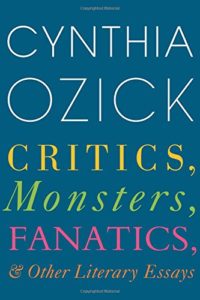
Critics, Monsters, Fanatics, and Other Literary Essays, Cynthia Ozick, Houghton Mifflin Harcourt
It is customary, it seems, for fiction writers faced with publishing their occasional pieces of nonfiction to affect an apologetic front for stepping out of their occupation and into another one (see Neil Gaiman below), but with the great Cynthia Ozick, no such contrition has ever, nor will ever, appear in her books. Though she is one of the most acclaimed fiction writers of the last 40 years, she has also regularly published bracingly intelligent collections of criticism, from 1983’s Art & Ardor to 2006’s The Din in the Head (with my personal favorite being 2000’s Quarrel & Quandary), and has established herself as one of the most invigorating critics as well. The opening essay here, “The Boys in the Alley, the Disappearing Readers, and the Novel’s Ghostly Twin,” is a comprehensive call-to-arms and an assessment of contemporary literary criticism (including biting takedowns of Jonathan Franzen’s 1998 Harper’s essay “Why Bother,” and Ben Marcus’s polemic “Why Experimental Fiction Threatens to Destroy Publishing, Jonathan Franzen, and Life as We Know It: A Correction,” both of which, Ozick smartly points out, argue about things that are, finally, beside the point). With additional perspectives on Kafka, Auden, Gass, and the Hebrew language, Ozick’s latest collection is another fantastic contribution from one of America’s best living writers.
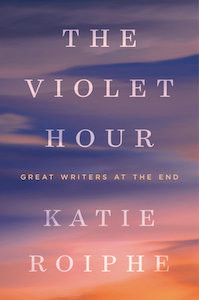
The Violet Hour: Great Writers at the End, Katie Roiphe, The Dial Press
One of the crispest and most gifted essayists writing now, Katie Roiphe follows her excellent collection In Praise of Messy Lives with a book focused on the deaths of major authors, biographically, psychologically, and emotionally. How did brilliant minds like Susan Sontag and Sigmund Freud approach their own mortality, especially when it was most imminent? And how does death affect the uniquely imaginative personality of Maurice Sendak? Or the Edmund Wilson-like productivity of John Updike? Roiphe wisely avoids drawing any concrete conclusions about death but instead humanely and penetratingly tells their stories (which also include Dylan Thomas and James Salter), and the lessons—however tenuous they may be—emerge themselves. Plus you just get such lovely details, for instance that it wasn’t until Freud’s trusty dog Lun began avoiding him that his approaching death finally struck him: a man who remained steadfastly (though probably, as Roiphe suggests, a bit affectedly) stoic regarding his own mortality, coming undone at the rejection of his loyal chow, who would sense, and respond to, the stench “of rotting, of corpses” with a frankness that most people would suppress or ignore. So Freud, the psychoanalyst, who had dedicated his life studying the nuances of the human psyche, in the end, still trusted an animal over any person.
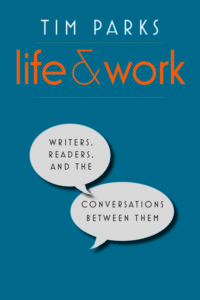
Life and Work: Writers, Readers, and the Conversations Between Them, Tim Parks, Yale University Press
Tim Parks has the distinction of being the only writer on both this and the previous “Best Books About Books” list. His last, Where I’m Reading From: The Changing World of Books, took on general topics like the Nobel Prize and copyright laws; his newest, Life and Work, focuses on individual writers and deliberately breaks the so-called “biographical fallacy” of criticism—which states that a critic cannot use the life of the author as a tool for insight into their work—because the details of an artist’s existence can offer unique insights not necessarily into the works themselves but in our reactions to them. Among the writers considered here are numerous standards—Dickens, Joyce, Beckett, Dostoyevsky—but there are also pieces on mega-bestsellers like E.L James, author of Fifty Shades of Grey, and Stieg Larsson, creator of The Girl with the Dragon Tattoo series, on which Parks has more than just snarky, condescending things to say. Parks does not substitute biographical minutiae for insight; rather, he allows the information in as a means to examine the way a novel’s myriad meanings reflect on the human being who wrote them, not unlike the way we might meditate on how a novel’s meaning relates to us as individuals, or society as a whole—speculatively, of course, but also usefully and, most importantly, artfully. Parks operates on the often unacknowledged fact that the conclusions of criticism are at root creative acts, an ability to connect disparate or seemingly unrelated notions, a literary mixing of paints, or maybe of shading so subtle that two vastly differing elements fit naturally and almost inevitably together on the canvas.
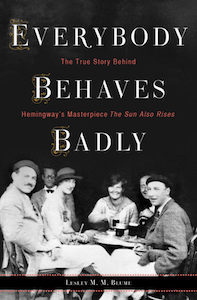
Everybody Behaves Badly: The True Story Behind Hemingway’s Masterpiece The Sun Also Rises, Lesley M. M. Blume, Houghton Mifflin Harcourt
Who doesn’t love a good biography of a book? A biography of a writer can get bogged down in sometimes banal aspects of childhood and familial ancestry, making the good bits—the parts where they, you know, wrote the things for which we’ve come to love or admire them—a chore to get to. But Lesley M. M. Blume’s Everybody Behaves Badly, an unabashedly fun and engrossing account of the years in Paris and Pamplona that inspired Ernest Hemingway’s classic 1926 novel The Sun Also Rises, is a treat for the literarily inclined, and fittingly reiterates Parks’s dismissal of the biographical fallacy. Of course Blume includes brief biographies of the primary cast—Hemingway, obviously, and his then wife Hadley; Lady Duff Twysden, who became the iconic Lady Brett Ashley; and Harold Loeb, who became the hapless villain Robert Cohn—but she does so as a novelist would, saddled though she is with precise dates and times, in brief but effective strokes. For fans of Hemingway’s novel, Blume’s book overflows with all the juicy energy of a popped champagne bottle (a metaphor Blume employs to characterize Hemingway’s feverish six-week-long drafting of his seminal debut), but for those who prefer his later work, or his war stories, or even for those who find Hemingway overrated, Everybody Behaves Badly can still be a rewarding experience—in fact, these latter folks may have the most to gain here, because in Blume’s gifted hands the story behind The Sun Also Rises demythologizes the aura surrounding it, renders it much more comprehensible as the work of a single person, a very flawed one at that, instead of some era-defining emblem chiseled in stone by History and Art.
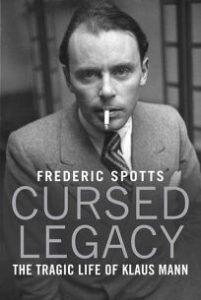
Cursed Legacy: The Tragic Life of Klaus Mann, Frederic Spotts, Yale University Press
Now here’s the kind of biography I can get stoked about: an illuminating tale of a forgotten or unheralded figure who deserves posthumous recognition. Cursed Legacy tells the story of Klaus Mann, whose life, according to Frederic Spotts, was “six times jinxed”:
A son of [Death in Venice and The Magic Mountain author] Thomas Mann. A homeless exile. A drug addict. A writer unable to publish in his native tongue. A not-so-gay gay. Someone haunted all his life by a fascination with death.
That’s certainly a promising list, drama-wise, but it’s also the makings of an important biography of a woefully neglected voice, an early crusader against the Nazis (when many were justifiably frightened), and one of the first writers of gay literature. But for Klaus Mann, none of these accomplishments would matter, as for all his talent and intelligence, for all his pedigree and ambition, he was without luck: his father, if his novels didn’t clue us in enough, turned out to be a real asshole; his German citizenship was revoked because of his anti-Nazi art; and then later in the United States, after serving as an American citizen in WWII as a Staff Sergeant, was accused of Soviet complicity. His novels and plays and essays and memoirs deserve another look, both for their consummate skill and their historical relevance. Mann was a man riddled with “frustration and hopelessness,” and Spotts pulls out an apt quotation for the ill-fated Klaus Mann, whose string of unfortunate catastrophes wound up confirming his bleak outlook: “A man with no luck? Get him out of my sight!” Though attributed to both Frederick the Great and Napoleon, it may as well be the booming voice of history. Luckily for us (ha ha) we now have Frederic Spotts’s passionate biography, a whisper, yes, but all we have to do is try to drown out the boom, and listen with everything we’ve got.
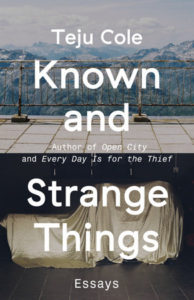
Known and Strange Things: Essays, Teju Cole, Random House
Though Teju Cole writes about a lot more than just books, I wanted to include him here because he is just so good—so very, very good—on literary matters. He visits Leukerbad in Switzerland, the setting of James Baldwin’s essay “Stranger in the Village” from Notes of a Native Son, and considers the changes since Baldwin stayed there in the 1950s; he recounts meeting V.S. Naipaul at a dinner party on the Upper West Side; he discusses Sonali Deraniyagala’s memoir Wave, about losing her “husband, her parents, her two sons, aged seven and five… in a single morning in December 2004, when the tsunami hit the resort where they were holidaying in Sri Lanka,” which contains “among the most difficult things I’ve ever read”; and he writes lovingly, with experience, about the poetry of Derek Walcott, Elizabeth Bishop, Tomas Tranströmer, and W.G. Sebald. There is a vitality to Cole’s analyses, a real personal investment, and an autobiographical component that enriches his interpretations. Throughout the book, Cole returns again and again to the violence perpetrated on black bodies and the injustices that pervade modern life, from police killings to “the fantasy of the disposability of black life.” His literary evocations, rather than being discrete entities that merely reflect the world are instead shown to be an integral part of the world, made in it, made of it, and completely enmeshed in its tragic multiplicities.
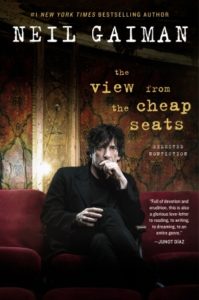
The View from the Cheap Seats: Selected Nonfiction, Neil Gaiman, William Morrow
Neil Gaiman—like oh so many fiction writers before him—begins his selected nonfiction as if cutting off what’s sure to be skepticism at the pass, explaining that although he left (“fled” and “back awkwardly away” are his verbs) journalism long ago, “a huge pile” of such work has nonetheless amassed over the years and so here is a volume of it—almost as if, like Zadie Smith says of her book of essays Changing My Mind, it were written without his knowledge. But such equivocations are just as unnecessary for Gaiman as they are for Smith, especially because Gaiman writes with such infectious enthusiasm and also because the topics he covers—sci-fi, fantasy, comics, children’s books—are not often the kinds you find in a work of literary criticism. So we get Gaiman’s appreciations of contemporaries like Terry Pratchett (with whom he co-authored Good Omens), Douglas Adams (from a usefully informative introduction to Adams’s odd fourth entry in the Hitchhiker’s Guide series, So Long and Thanks for All the Fish), and Stephen King, but there are also essays dedicated to Diana Wynn Jones, Gene Wolfe, M. John Harrison, Fritz Leiber, and Kurt Busiek. As in his fiction, Gaiman is a wonderful guide, an eloquent and charming presence, and one who can say such profound things that are also profoundly obvious and still make them seem vital, as in his introduction from Ray Bradbury’s Fahrenheit 451, where he reminds us, “If someone tells you what a story is about, they are probably right. If they tell that that is all the story is about, they are very definitely wrong.” He then adds:
Any story is about a host of things. It is about the author; it is about the world the author sees and deals with and lives in; it is about the words chosen and the way those words are deployed; it is about the story itself and what happens in the story; it is about the people in the story; it is polemic; it is opinion.
This may be as axiomatic as saying, People are complex! but often such apparently self-evident ideas get lost in our visceral reactions to things, and it is sometimes important to stop for a moment and remind ourselves that in life, just like in a Neil Gaiman novel, there is always more going on than we think.
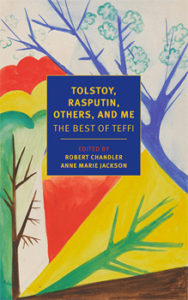
Tolstoy, Rasputin, Others, and Me: The Best of Teffi, Teffi, New York Review Books
Teffi was the nom de plume (or maybe nom de guerre, would be more accurate) of Nadezhda Lokhvitskaya, who was born to a prominent family in Russia in 1872 but was forced to vacate after the October Revolution in 1917. By 1920, she’d settled in Paris and began publishing stories and memoirs of her early life, including a reminiscence of reading War and Peace at 13 and falling in “love with Prince Andrei Bolkonsky,” the pensive aide-de-camp hero, and how she was so devastated (spoiler alert) when his character died that she “decided to go see Tolstoy and ask him to save Prince Andrei.” These pieces from this period are collected in Tolstoy, Rasputin, Others, and Me, and what a wondrous confection it is. The best and most haunting story is Teffi’s tale of meeting (and being creepily wooed by) Rasputin. It’s the longest piece in the book but certainly the most fascinating. Rasputin, such a legendary figure, emerges as a “repulsive,” “semi-literate” predator of women. Teffi records his attempts to convince her to “come to me” by assuring her, from personal knowledge, that “God will forgive you.” Makes one shiver in revulsion. She also writes of her writing life in Paris, her first visit to an editorial office, and the origin of her pseudonym (from a clown named Taffy, though other times she credited a friend named Steffi with the name)—and though she is most famous for Memories (which has been published simultaneously with this volume), her memoir of leaving Russia and traveling to Istanbul, for me Teffi’s short takes are a wonderful introduction to a treasury of wit and will.
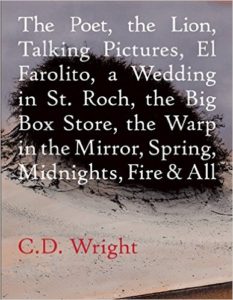
The Poet, the Lion, Talking Pictures, El Farolito, a Wedding in St. Roch, the Big Box Store, the Warp in the Mirror, Spring, Midnights, Fire & All, C.D. Wright, Copper Canyon Press
The late, great C.D. Wright’s final publication while she was alive is made up of essays only she could have written. They are, like her previous book Cooling Time, more like poems, or I suppose prose-poems (or as the jacket description has it, “prosimetrical essays”). Some of them merely a paragraph, a line or two—as in “Bookburn”: “Speaking personally, to read or not to read is like asking to starve or not to starve. I am still attached to the illusion that I can lay a hand on a book and feel its heat”—but this is not to say that Wright doesn’t make aesthetic or critical arguments. Rather, it is that her arguments too emerge as in a poem, and so some of the typical (and mostly superfluous) rancor of conventional criticism is absent. Instead Wright mostly makes her points through expressions of love, as in her numerous homages to Jean Valentine or her appreciation of Brenda Hillman’s Seasonal Works with Letters of Fire. In the book’s longest piece, “Concerning Why Poetry Offers a Better Deal Than the World’s Biggest Retailer,” Wright argues that “poetry can no longer be assigned filler space” and makes an insightful distinction between a poem and poetry: “A blank page can serve as one poem, as close to perfect as one poem may come. It cannot serve as poetry.” What a poet is able to do, then, within the confines of a single poem does not constitute what the whole of poetry encompasses. Wright passionately believed in poetry—had the deepest, abiding love for it—and reading her now, despite the fecund state of contemporary poetics, I’m not only personally inspired but am even a little bit hopeful for the future, though it is a future we’ll have to face without C.D. Wright. Thank poetry we have her work.
Jonathan Russell Clark
Jonathan Russell Clark is the author of Skateboard and An Oasis of Horror in a Desert of Boredom. His writing has appeared in the New York Times, L.A. Times, Boston Globe, and Esquire. He's also a columnist for Tasteful Rude.









